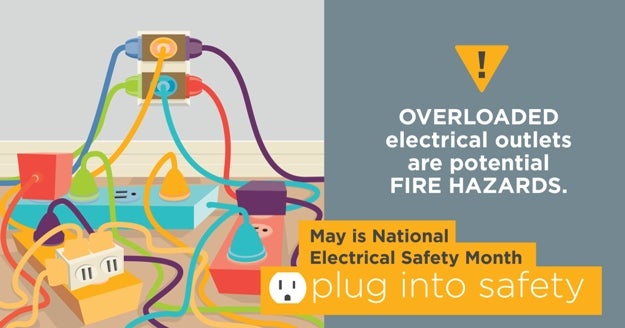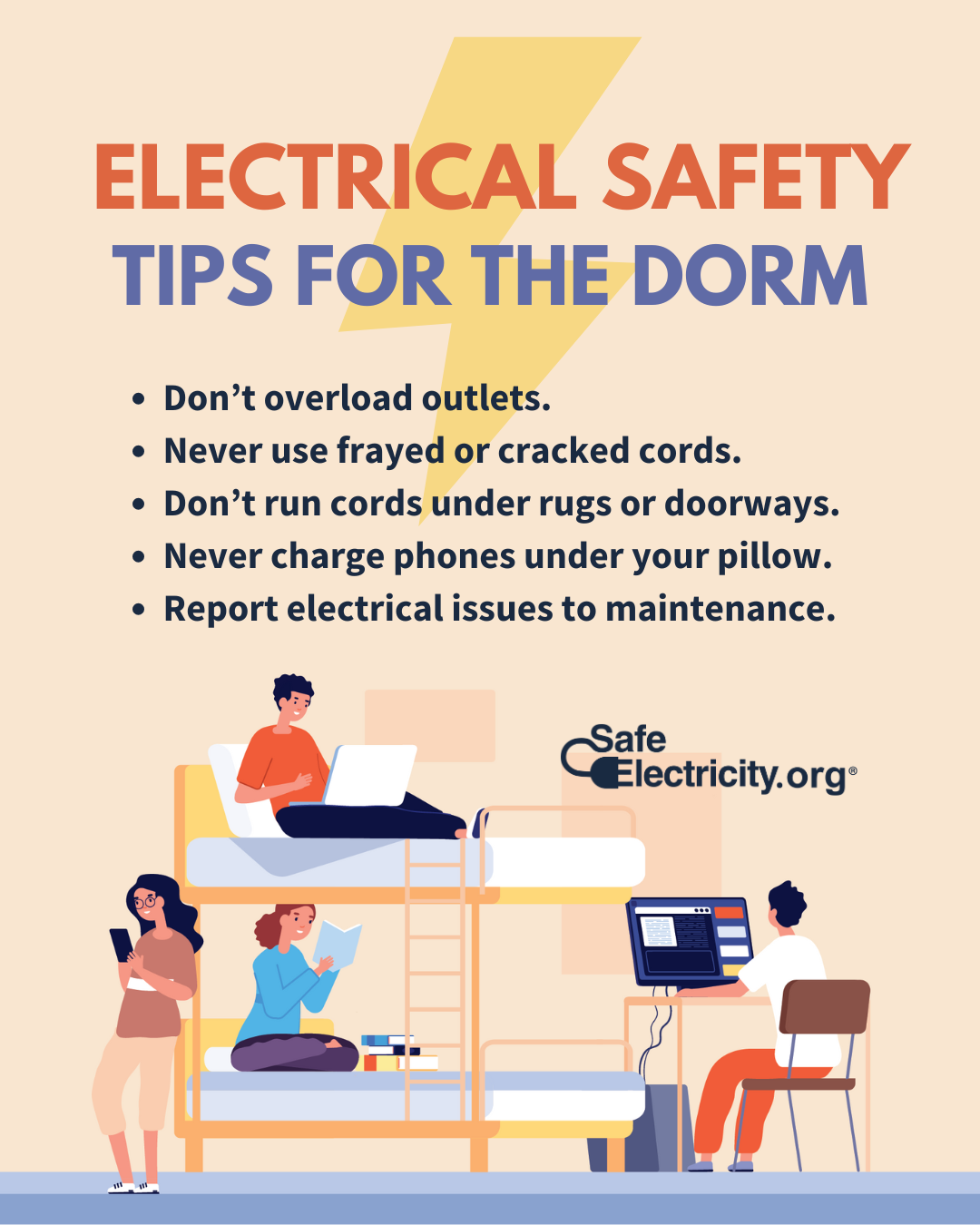
Additional Safety Tips



Electrical power is an integral part of the modern farm operation and Jump River Electric Cooperative is proud to provide that dependable electric power that you rely upon. Jump River Electric also provides information about recent research, new technology and appropriate safety requirements as they apply to the farm operation. The following resources are aimed at assisting you with this goal.
The National Education Center for Agricultural Safety (NESC) offers farm training and education and many safety tips. Find out more at http://www.nsc.org/necas/
Line Clearance for Grain Bins
The National Electric Safety Code defines utility line clearance requirements.

Farm Safety for Kids: Farms are fun places - with all that fresh air, sunshine, and room to run around. But they're also places where real work gets done. And some of that work involves equipment that can be dangerous if someone doesn't know how to be safe.
Kids who live on farms really need to know what it takes to be safe. They probably help out on the farm and need to know the safety rules that can prevent injuries. According to the National Safety Council, farming is one of America's most hazardous jobs. Kids ages 10 to 14 are at high risk for injury, often because they take on a job or task that they aren't ready to handle.
Here is a website you might want to check out regarding kids and farm safety: https://www.progressiveag.org/

Before you purchase a Generator, view this Quick Guide to Generators or Video.
PORTABLE GENERATORS
Portable electric generators can be very helpful to members during outages, but we urge you to follow the safety guidelines below to insure your portable generator is connected in the safest manner.
What to do before using a generator.
Portable Generator Safety Guidelines listed below:
Never connect a generator directly to your home's wiring unless your home has been wired for generator use. This can cause backfeeding along power lines and electrocute anyone coming in contact with them, including lineworkers making repairs.
Ensure your generator is properly grounded.
Set up and run your generator in a well-ventilated area outside the home. Make sure it's out and away from your garage, doors, windows, and vents. The carbon monoxide generated is deadly.
Never overload a generator. A portable generator should only be used when necessary to power essential equipment or appliances.
Turn off all equipment powered by the generator before shutting it down.
Keep the generator dry. Operate it on a dry surface under an open structure.
Always have a fully charged fire extinguisher nearby.
Never fuel a generator while it is operating.
Read and adhere to the manufacturer's instructions for safe operation. Never cut corners when it comes to safety.
We encourage you to protect the well-being and safety of your family during outages, and safeguard those who come to your aid during emergency situations.



Electric space heaters can help warm a room quickly. However, they can be as dangerous as convenient if used improperly. Safe Electricity urges everyone in the home to understand the importance of using space heaters safely:
- Purchase only space heaters that have been safety tested and UL approved. Make sure the unit has an emergency tip-over shut-off feature and heating element guards. Read and follow the manufacturer’s instructions for operation and care.
- Before using a space heater, make sure your smoke and carbon monoxide detectors are in good working condition.
- Make sure the heater is clean and in good condition.
- Place the heater out of high-traffic areas and on a level, hard, non-flammable floor surface—NOT on carpets, furniture, or countertops.
- Space heaters have one purpose —to provide supplemental heating. Never use them to thaw pipes, cook food, or dry clothing or towels.
- Remember to keep space heaters at least three feet from combustible liquids, like fuel, spray cans, and paint, and flammable items such as draperies, blankets, and sofas.
- Never allow pets or children near an electric heater. Accidental contact could cause serious shock or burns.
- Do not overload circuits. Never use extension cords or multiple plugs with a space heater and make sure not to plug the unit into the same circuit as other electric appliances.
- If your space heater is plugged into a ground fault circuit interrupter (GFCI) and it trips, don’t assume there is something wrong with the GFCI. Immediately stop using the heater until a professional can check it— if not, a serious shock could occur.
- Never leave space heaters unattended. Turn off your space heater and unplug it before leaving the room or going to bed.
- Replace older space heaters with newer, safer models.
Many people also use electric blankets to keep warm during cold winter nights. Before plugging in electric blankets, check for any damage and inspect cord for frays, cracks, or cuts. Do not tuck electric blankets under the mattress and place nothing on top of the blanket while it’s in use, including comforters and bedspreads. Don’t allow pets to sleep on the electric blanket.
Before and After the Storm
Severe storms are more common in the spring and summer, but they can occur any time of year. Be prepared for storms and know how to stay safe.
Before the storm:
- Assemble a kit of essentials, like water, battery-operated flashlights, and radios. Keep a list of emergency phone numbers, including the electric utility. Be prepared for the possibility of a prolonged outage due to power line and electric equipment damage. Storm Preparedness Checklilst
- If severe weather is on its way, pay attention to local weather reports and recommendations. A tornado or severe storm watch means conditions are favorable for those weather conditions forming. A warning means dangerous weather conditions are developing and imminent.
- Lightning can travel up to ten miles away from a storm, so seek shelter when you hear thunder.
- Consider installing ground fault circuit interrupters (GFCIs) or purchasing a portable GFCI. GFCIs detect dangerous electrical situations and cut off power before a person can be shocked. These dangerous electrical situations are likely to occur around water, so GFCIs should be installed in bathrooms, laundry rooms, kitchens, basements, outdoors and anywhere else water and electricity may meet
- If power goes out, switch off lights, large electronics and appliances to prevent overloading circuits and damaging appliances when power is restored. Leave one lamp or switch on as a signal for when your power returns.
After the storm:
- When venturing outside, stay away from downed power lines and be alert to the possibility that tree limbs or debris may hide an electrical hazard. Assume any dangling wires you encounter are energized and dangerous. Warn others to stay away and contact the electric utility.
- If you are driving and come upon a downed power line, stay in your vehicle, warn others to stay away, and contact emergency personnel or electric utility. Also, when driving, be careful at intersections where traffic lights may be out. Stop at all railroad crossings and treat road intersections with traffic signals as a four-way stop before proceeding with caution.
- Before re-entering storm-damaged buildings or rooms, be sure all electric and gas services are turned off. Never attempt to turn off power at the breaker box if you must stand in water to do so. If you can’t reach your breaker box safely, call your electric utility to shut off power at the meter.
- Never step into a flooded basement or other area if water is covering electrical outlets, appliances, or cords. Be alert to any electrical equipment that could be energized and in contact with water. Never touch electrical appliances, cords, or wires while you are wet or standing in water.
- Do not use water-damaged electric items until a qualified electrician has inspected them and ensured they are safe.
- When using a portable generator, follow all manufacturers’ recommendations. Keep the generator dry and never plug it into a wall outlet or directly into the home’s wiring. This could inadvertently energize the utility lines and injure yourself or others working to restore power.
- A permanent standby generator should be professionally installed and include a transfer switch to prevent electricity from leaving your generator and going into power lines where it can kill line workers.

Preparing for disasters is protecting everyone you love. Follow these steps to ensure that you and your family are prepared if a disaster were to hit your neighborhood.
1) Have a plan, 2) Build an emergency kid with items listed below, and 3) Teach Youth About Preparedness.
Find more about electric safety on this site, at safeelectricity.org, or watch this video for more tips. Source: ready.gov.

Distracted Driving/Work Zone Safety
There’s not one text, phone call or any other driver distraction that’s worth your life or the life of anyone else, yet it’s an increasing problem. The resulting accidents are devastating to everyone connected to those killed or injured. There is a roadside work zone crash every few minutes in this country, and electric utility workers have been killed and injured in such incidents. Laws in most states require motorists to change lanes and slow down when someone is on the side of the road, with tougher penalties for those who disobey. Hear from law enforcement and utility safety leaders, as well as a line crew affected by distracted driving.
The “License to Live” campaign is aimed at making sure people know exactly what to do when your car comes into contact with a utility pole or wire, including:
• STAY IN YOUR vehicle and call 911
• ONLY get out of the vehicle if it is on fire
• IF you must get out, jump from the vehicle with both feet together, and shuffle your feet on the ground as you move away from the scene
• ALWAYS assume all wires and equipment are electrified
Electrical Safety Tips
No other form of energy plays such an important role in our lives. That's because electricity is more convenient, more economical, more reliable and safer to use. So please follow these safety rules.
Keep kites, ladders, tree trimmers, tools, antennas and other objects a safe distance from overhead power lines. Power lines may look harmless, but they can be deadly. And never, ever go near a downed power line. Call us if you see one.
Everyone should know the benefits of electricity. They should also know the dangers. So teach your children how to safely use electricity at an early age. Some extra precautions now can prevent disaster later.
-
Install plugs to cover unused outlets if there are small children in the house.
-
Never leave lamp sockets empty - replace burned-out bulbs immediately.
-
Children should never play near power lines or substations.
-
Teach your children about the potential dangers of misusing electrical power before it's too late.
Please follow these rules when using electrical appliances:
-
Keep appliances such as hairdryers, radios, and televisions away from sinks and bathtubs.
-
Always dry your hands before using them.
-
Avoid using electrical tools or appliances near water or wet ground outside of your home.
-
Replace any frayed or cracked cords or broken plugs immediately.
-
Avoid running cords under rugs or furniture to keep them from being damaged.
-
Use extension cords only as a temporary connections. Never plug one cord into another.
-
Never carry an appliance by the cord.
-
Disconnect all appliances by pulling the plug directly from the socket, NOT by pulling the cord.
-
Use only double-insulated power tools with three-pronged plugs.
-
Limit the number of appliances plugged into a single outlet. Overloading a circuit can cause fires.
-
Water serves as a conductor for electricity, and that can lead to serious injury or death. Keep all appliances away from water!
Jump River Electric also has employees available to do presentations on electrical safety. If you would like to schedule a presentation for your group please contact us at 715-532-5524.
Additional electrical safety tips can be found on this page or you can also click on the following link http://www.safeelectricity.org to find out more about electrical safety. This site offers electrical safety video's and many other learning opportunities.




